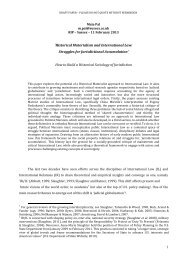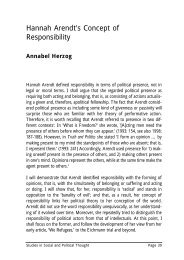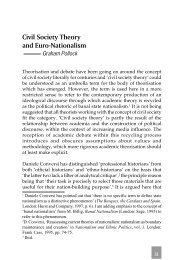Just a Matter of Choice? Student Mobility as - University of Sussex
Just a Matter of Choice? Student Mobility as - University of Sussex
Just a Matter of Choice? Student Mobility as - University of Sussex
You also want an ePaper? Increase the reach of your titles
YUMPU automatically turns print PDFs into web optimized ePapers that Google loves.
esearch (cf. Millar and Salt 2008 for some<br />
preliminary survey results amongst UK<br />
university career services used by<br />
employers to recruit international students).<br />
However, one can also attempt to avoid the<br />
narrow focus <strong>of</strong> such „choice models‟,<br />
without immediately abandoning the<br />
„demand side‟, by <strong>as</strong>king other questions<br />
and following different methodologies.<br />
Thus, the question <strong>of</strong> why students go<br />
abroad needs to be turned into: How do<br />
they become geographically mobile? In<br />
doing so, attention automatically shifts<br />
towards a processual perspective: the usual<br />
<strong>as</strong>sumption <strong>of</strong> the student <strong>as</strong> the main<br />
agent whose motivations cause the move<br />
abroad is relaxed and the influence <strong>of</strong> other<br />
actors and events that have been involved<br />
in the process <strong>of</strong> becoming mobile can be<br />
observed; studying abroad is not<br />
necessarily any more the result <strong>of</strong> a one-<strong>of</strong>f<br />
choice, but instead the outcome <strong>of</strong> a<br />
sequence <strong>of</strong> events which in the end lead<br />
the student abroad.<br />
The next section <strong>of</strong> the paper presents the<br />
research design and the methods used to<br />
approach this question empirically. It also<br />
discusses critically some <strong>of</strong> the choices<br />
made by the author in this regard, e.g.<br />
concerning the selection <strong>of</strong> respondents.<br />
The main part <strong>of</strong> the paper consists then <strong>of</strong><br />
an analysis <strong>of</strong> the empirical material<br />
regarding three different <strong>as</strong>pects: the role<br />
<strong>of</strong> previous mobility experiences, the role <strong>of</strong><br />
social relations the students have been<br />
embedded in prior to their departure, and<br />
the impact <strong>of</strong> time. By focusing on these<br />
<strong>as</strong>pects in relation to the process <strong>of</strong><br />
becoming a mobile student, the paper<br />
attempts to delineate how those<br />
motivations which students usually report in<br />
surveys partly come about and how the<br />
trajectory which ultimately leads them<br />
abroad for educational purposes h<strong>as</strong> been<br />
shaped by influences quite independent <strong>of</strong><br />
their own making.<br />
Research design and methods<br />
The following empirical analysis is b<strong>as</strong>ed on<br />
22 narrative-biographical interviews with<br />
Germans who studied abroad for an entire<br />
undergraduate or postgraduate degree.<br />
Contrary to prior research on student<br />
mobility, which mostly focused on credit<br />
student mobility (cf. for example Teichler<br />
2002; King and Ruiz-Gelices 2003; Bracht<br />
et al. 2006; Parey and Waldinger 2011),<br />
degree-mobile students have been chosen<br />
here <strong>as</strong> the target group (for the scarce<br />
research on this group, cf. Wiers-Jenssen<br />
2008; Findlay and King 2010). On the one<br />
hand, degree student mobility seems to<br />
play a far more important role numerically<br />
in some receiving countries than usually<br />
noticed. National statistics on higher<br />
education from the Netherlands and the<br />
United Kingdom – being among those<br />
countries which receive the biggest shares<br />
<strong>of</strong> German students going abroad<br />
nowadays (Statistisches Bundesamt 2008:<br />
10, 18) – show that at le<strong>as</strong>t in these two<br />
countries credit-mobile students are by far<br />
outweighed by the other group. 3 On the<br />
other hand, Gordon and Jallade <strong>as</strong>sert that<br />
degree student mobility – or „spontaneous<br />
mobility‟ <strong>as</strong> they call it – comes about<br />
independently from „organised financial or<br />
structural support‟ (1996: 133), implying<br />
that this form <strong>of</strong> mobility is rather b<strong>as</strong>ed on<br />
choice than that <strong>of</strong> those students following<br />
„organised‟ mobility patterns (i.e. exchange<br />
programmes, the ERASMUS programme<br />
etc.). Given the introductory discussion and<br />
critique <strong>of</strong> the dominant push-pull-cumrational-choice<br />
models, this makes degreemobile<br />
students the far more interesting<br />
group to study (cf. Carlson 2011 for a more<br />
extensive discussion <strong>of</strong> this argument).<br />
The sampling relied on „snowballing‟, first<br />
via personal contacts, then via contacts <strong>of</strong><br />
the interviewees; in order to minimise<br />
bi<strong>as</strong>es caused by this strategy, care w<strong>as</strong><br />
taken during the selection procedure to<br />
achieve a sample <strong>as</strong> diverse <strong>as</strong> possible in<br />
terms <strong>of</strong> gender, country and subject <strong>of</strong><br />
study (for an overview <strong>of</strong> the respondents,<br />
see the table in the Annex at the end <strong>of</strong> the<br />
3 In the academic year 2002/2003, only 22 % <strong>of</strong> German<br />
students studying in the UK were there for credit re<strong>as</strong>ons<br />
(Sibson 2006: 110) and in the Netherlands their share<br />
accounted for barely 9 % in the academic year<br />
2004/2005 (NUFFIC 2005: 26, 30).<br />
4

















